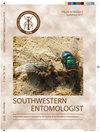减少牛热蜱在南德克萨斯州野生动物中的传播和保护当地濒危物种的预防方法
IF 0.4
4区 农林科学
Q4 ENTOMOLOGY
引用次数: 0
摘要
摘要沿着美墨边境最南端的卡梅伦县和威拉西县,牲畜和野生动物害虫,南方牛热蜱,微头蜱(Canestrini)的重新引入和传播,主要归因于nilgai羚羊,Boselaphus tragocamelus (Pallas),以及较小程度的白尾鹿Odocoileus virginianus (Zimmerman)。Nilgai是microplus r.的称职宿主,有很大的家庭范围,从德克萨斯州南部分布到墨西哥东北部,在那里microplus r.是牛巴贝斯虫病的一种病媒,是地方性的。这项研究记录了nilgai和白尾鹿穿过猎场围栏的运动,这些围栏以前是用来引导濒危豹猫(Leopardus pardalis, L.)的运动到野生动物交叉点的。围栏限制了nilgai和白尾鹿的活动,从而减少了牛热蜱的传播。额外的狩猎围栏被提议来限制被蜱虫感染的nilgai,白尾鹿的活动,并进一步将豹猫引导到十字路口,以避免在道路上死亡。在卡梅隆和威拉西县的其他地方,道路上豹猫的死亡不是问题,狩猎围栏设计了大开口,以阻止nilgai,但允许濒危猫科动物自由活动。这项研究表明,保护牲畜免受外来有害生物侵害的努力也可以与保护同一环境中濒危物种的目标相结合。本文章由计算机程序翻译,如有差异,请以英文原文为准。
Preventative Methods to Reduce the Spread of Cattle Fever Ticks on Wildlife and Protect Local Endangered Species in South Texas
Abstract. Reintroduction and dispersal of the livestock and wildlife pest, southern cattle fever tick, rhipicephalus (Boophilus) microplus (Canestrini), along the U.S.Mexico border in the southernmost counties of Cameron and Willacy has been attributed mostly to nilgai antelope, Boselaphus tragocamelus (Pallas), and to a lesser extent, white-tailed deer, Odocoileus virginianus (Zimmerman). Nilgai are competent hosts of r. microplus, have large home ranges, and are distributed from southern Texas into northeastern Mexico where r. microplus, a vector of bovine babesiosis, is endemic. The study documents movement of nilgai and white-tailed deer through gaps in game fencing previously built to redirect movements of the endangered ocelot, Leopardus pardalis (L.), to wildlife crossings. Game fencing limits movement of nilgai and white-tailed deer and thus reduces the spread of cattle fever ticks. Additional game fencing is proposed to limit movement of tick-infested nilgai, white-tailed deer, and further redirect ocelots to crossings to avoid mortality on roads. In other parts of Cameron and Willacy counties where road mortality to ocelots is not an issue, game fencing is designed with large openings to block nilgai but allow free movement for endangered feline species. This research demonstrates how efforts to protect livestock from an exotic pest can also merge with goals of protecting endangered species in the same environment.
求助全文
通过发布文献求助,成功后即可免费获取论文全文。
去求助
来源期刊

Southwestern Entomologist
生物-昆虫学
CiteScore
0.60
自引率
25.00%
发文量
95
审稿时长
6-12 weeks
期刊介绍:
Manuscripts submitted for consideration for publication in the Southwestern Entomologist should report results of entomological research in the southwestern United States or Mexico or should report results of studies on entomological species, relevant to this region, which may be done elsewhere, provided such results are geographically applicable. Manuscripts that report results of routine laboratory or field experiments for which the primary purpose is gathering baseline data or those that report results of a continuous evaluation program such as preliminary pesticide evaluation experiments, species lists with no supporting biological data, or preliminary plant resistance evaluations are not acceptable. However, reports of experiments with insecticides, acaricides, and microbials are acceptable if they are comprehensive and include data related to economics, resistance, toxicology, or other broad subject areas. Bibliographies will not be published in Southwestern Entomologist.
 求助内容:
求助内容: 应助结果提醒方式:
应助结果提醒方式:


